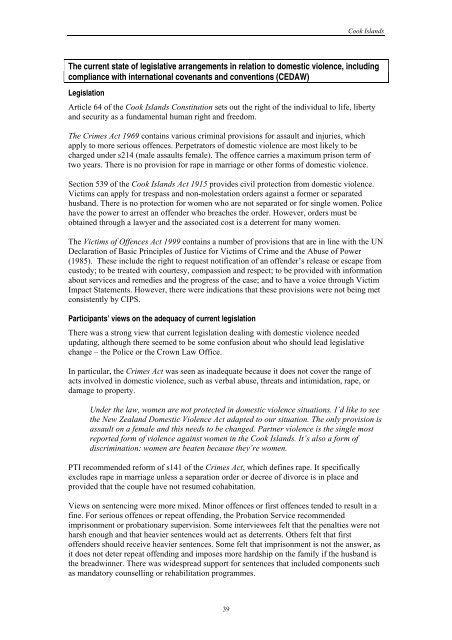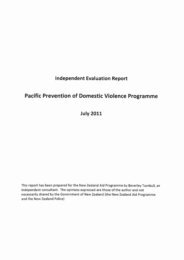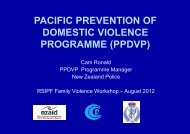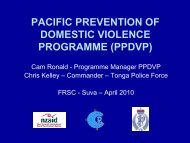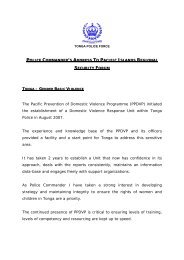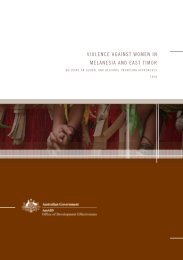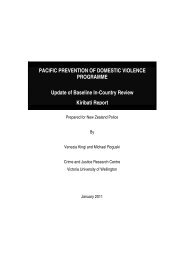Cook Islands - Pacific Prevention of Domestic Violence Programme
Cook Islands - Pacific Prevention of Domestic Violence Programme
Cook Islands - Pacific Prevention of Domestic Violence Programme
Create successful ePaper yourself
Turn your PDF publications into a flip-book with our unique Google optimized e-Paper software.
<strong>Cook</strong> <strong>Islands</strong><br />
The current state <strong>of</strong> legislative arrangements in relation to domestic violence, including<br />
compliance with international covenants and conventions (CEDAW)<br />
Legislation<br />
Article 64 <strong>of</strong> the <strong>Cook</strong> <strong>Islands</strong> Constitution sets out the right <strong>of</strong> the individual to life, liberty<br />
and security as a fundamental human right and freedom.<br />
The Crimes Act 1969 contains various criminal provisions for assault and injuries, which<br />
apply to more serious <strong>of</strong>fences. Perpetrators <strong>of</strong> domestic violence are most likely to be<br />
charged under s214 (male assaults female). The <strong>of</strong>fence carries a maximum prison term <strong>of</strong><br />
two years. There is no provision for rape in marriage or other forms <strong>of</strong> domestic violence.<br />
Section 539 <strong>of</strong> the <strong>Cook</strong> <strong>Islands</strong> Act 1915 provides civil protection from domestic violence.<br />
Victims can apply for trespass and non-molestation orders against a former or separated<br />
husband. There is no protection for women who are not separated or for single women. Police<br />
have the power to arrest an <strong>of</strong>fender who breaches the order. However, orders must be<br />
obtained through a lawyer and the associated cost is a deterrent for many women.<br />
The Victims <strong>of</strong> Offences Act 1999 contains a number <strong>of</strong> provisions that are in line with the UN<br />
Declaration <strong>of</strong> Basic Principles <strong>of</strong> Justice for Victims <strong>of</strong> Crime and the Abuse <strong>of</strong> Power<br />
(1985). These include the right to request notification <strong>of</strong> an <strong>of</strong>fender’s release or escape from<br />
custody; to be treated with courtesy, compassion and respect; to be provided with information<br />
about services and remedies and the progress <strong>of</strong> the case; and to have a voice through Victim<br />
Impact Statements. However, there were indications that these provisions were not being met<br />
consistently by CIPS.<br />
Participants’ views on the adequacy <strong>of</strong> current legislation<br />
There was a strong view that current legislation dealing with domestic violence needed<br />
updating, although there seemed to be some confusion about who should lead legislative<br />
change – the Police or the Crown Law Office.<br />
In particular, the Crimes Act was seen as inadequate because it does not cover the range <strong>of</strong><br />
acts involved in domestic violence, such as verbal abuse, threats and intimidation, rape, or<br />
damage to property.<br />
Under the law, women are not protected in domestic violence situations. I’d like to see<br />
the New Zealand <strong>Domestic</strong> <strong>Violence</strong> Act adapted to our situation. The only provision is<br />
assault on a female and this needs to be changed. Partner violence is the single most<br />
reported form <strong>of</strong> violence against women in the <strong>Cook</strong> <strong>Islands</strong>. It’s also a form <strong>of</strong><br />
discrimination: women are beaten because they’re women.<br />
PTI recommended reform <strong>of</strong> s141 <strong>of</strong> the Crimes Act, which defines rape. It specifically<br />
excludes rape in marriage unless a separation order or decree <strong>of</strong> divorce is in place and<br />
provided that the couple have not resumed cohabitation.<br />
Views on sentencing were more mixed. Minor <strong>of</strong>fences or first <strong>of</strong>fences tended to result in a<br />
fine. For serious <strong>of</strong>fences or repeat <strong>of</strong>fending, the Probation Service recommended<br />
imprisonment or probationary supervision. Some interviewees felt that the penalties were not<br />
harsh enough and that heavier sentences would act as deterrents. Others felt that first<br />
<strong>of</strong>fenders should receive heavier sentences. Some felt that imprisonment is not the answer, as<br />
it does not deter repeat <strong>of</strong>fending and imposes more hardship on the family if the husband is<br />
the breadwinner. There was widespread support for sentences that included components such<br />
as mandatory counselling or rehabilitation programmes.<br />
39


